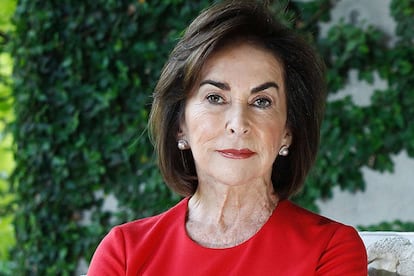The hermetic life of Iris Fontbona, the richest woman in Latin America
‘Bloomberg’ attributes a fortune of $28.8 billion to the widow of Andrónico Luksic Abaroa, the founder of Chile’s largest business empire. Fontbona is the matriarch of the family


Almost a month after the death of Andrónico Luksic Abaroa (1926-2005) — the man who created the biggest business empire in Chile — several politicians paid tribute to his memory in the National Congress. After a series of laudatory speeches offered by parliamentarians, Andrónico Luksic Craig took the floor. The eldest son — who, at the time, was vice-president of the Bank of Chile — hadn’t made it in time to his father’s funeral, since he was in Indonesia at the time of his death. It had taken him 39 hours to fly back to Santiago, the Chilean capital.
In the first public farewell to the patriarch of the business clan, he stated: “Without a doubt, from now on, my mother takes the reins… her children will support her. I’m sure that [God] will give us a mother for many more years.” Luksic Craig was referring to Iris Fontbona, the richest woman in Latin America, with family assets calculated at $28.8 billion, after a growth of 18% in 2023. This is according to the ranking recently published by Bloomberg.
Most of the fortune comes from control of almost 70% of Antofagasta PLC — one of the largest copper producers in the world — and 83% of Quiñenco, the conglomerate that brings together the Luksic Group companies that aren’t involved in mining. Fontbona and her children also own more than 84% of the Plava Laguna Hotel Group, registered in Zagreb, Croatia.
According to Bloomberg, the family controls Antofagasta PLC and Quiñenco through several investment vehicles based in the principality of Liechtenstein, a small tax haven located between Austria and Switzerland.
Iris Balbina Fontbona González, 81, was born in the northern city of Antofagasta, a mining center. The nitrate industry had its peak there, between the second-half of the 19th century and the first decades of the 20th century. It attracted both Chileans and foreigners to the area.
Iris is the only daughter of the marriage between Luis Fontbona Buxallen and Emma González Morales, both from the city of Valparaíso. After studying Commerce, Luis moved with his wife to Antofagasta, which, at the time, had about 50,000 inhabitants. The city is located in the middle of the driest desert in the world, the Atacama Desert. Iris grew up there, studying at a Catholic girls’ school.
In the early-1960s, young Iris met Andrónico Luksic Abaroa, a businessman of Croatian descent. He was 16 years older than her. Luksic — who had studied in France and was dedicated to the mining industry — had recently been widowed and was responsible for two small sons: Andronico and Guillermo. They married and had three children: Paola (1962), Jean Paul (1964) and María Gabriela (1965). In the middle of that decade, the entire family moved to Santiago, although in the summers, it was common to see them all at their house in the Hornitos spa town, an hour from Antofagasta. They also owned a 50,000-hectare estate on the banks of the Panguipulli River, in the south of Chile.
How Luksic amassed his fortune in the mining, financial and industrial sectors has been well-documented. However, little is known about Iris Fontbona. Completely hermetic from the press and highly-protected by her inner-circle, the information that circulates about her usually comes from third parties, who prefer to remain anonymous. Andronico Luksic Craig — without officially being a spokesperson for her — is the one who has referred to his stepmother most frequently. “I have two mothers,” he once noted. “One who died in 1959, when I was four-years-old, and another who took care of me since I was seven, who has been my mother to this day, whom I love, respect and adore above all things.”
After the death of her husband in 2005, Fontbona inherited his fortune and became the matriarch of the Luksic family. The three male children took over the different parts of the business empire. While Iris doesn’t participate on the boards of the group’s companies that are listed on the stock market, according to the Chilean newspaper La Segunda, she does control the board of directors of the foundation created by her husband. From this foundation, she exercises ownership over the entire empire that the businessman and his family created in Chile, Argentina, Uruguay, Canada, the United States and Croatia. This is according to the records from the U.S. Securities and Exchange Commission (SEC), which were accessed by the Chilean newspaper.
Sign up for our weekly newsletter to get more English-language news coverage from EL PAÍS USA Edition
Tu suscripción se está usando en otro dispositivo
¿Quieres añadir otro usuario a tu suscripción?
Si continúas leyendo en este dispositivo, no se podrá leer en el otro.
FlechaTu suscripción se está usando en otro dispositivo y solo puedes acceder a EL PAÍS desde un dispositivo a la vez.
Si quieres compartir tu cuenta, cambia tu suscripción a la modalidad Premium, así podrás añadir otro usuario. Cada uno accederá con su propia cuenta de email, lo que os permitirá personalizar vuestra experiencia en EL PAÍS.
¿Tienes una suscripción de empresa? Accede aquí para contratar más cuentas.
En el caso de no saber quién está usando tu cuenta, te recomendamos cambiar tu contraseña aquí.
Si decides continuar compartiendo tu cuenta, este mensaje se mostrará en tu dispositivo y en el de la otra persona que está usando tu cuenta de forma indefinida, afectando a tu experiencia de lectura. Puedes consultar aquí los términos y condiciones de la suscripción digital.








































